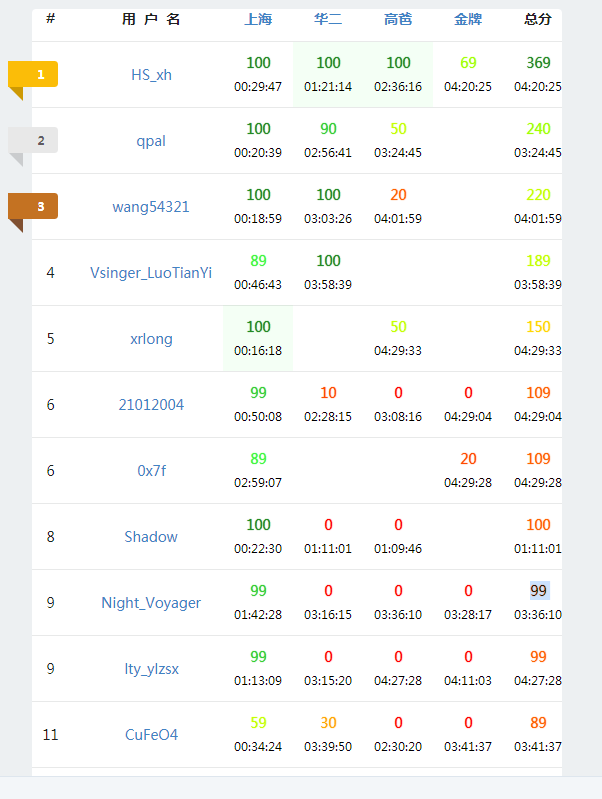2024初三年前集训测试2
0pts 遗憾离场。
我咋啥也不会。
赛后题解
比较有质量的一场,但是为啥同时是 NOIP 模拟赛和 CSP 模拟赛啊(?
T1 上海
分解 \(k\) 的质因数,如果 \(n\) 的公共质因子的个数多于 \(\frac {k_{c_i}} 2\),则满足条件。
如果最终构造的数与 \(k\) 相等,则无解。
Code
#include<bits/stdc++.h>
using namespace std;
#define int long long
const int N=5e4;
const int INF=1e9;
const int maxn=0x3f3f3f3f;
int n,m,maxx,cnt,root;
int ans=1;
inline int read()
{
int s = 0,w = 1;char ch = getchar();
while(ch<'0'||ch>'9'){ if(ch == '-') w = -1;ch = getchar();}
while(ch>='0'&&ch<='9'){ s = s*10+ch-'0';ch = getchar();}
return s*w;
}
int k;
signed main()
{
freopen("a.in","r",stdin);
freopen("a.out","w",stdout);
k=read();
m=k;
for(int i=2;i<=sqrt(k);++i)
{
//cout<<i*i%k;
int tot=0;
for(;(k%i)==0;k/=i) ++tot;
for(int j=1;j<=(tot+1)/2;++j) ans*=i;
}
ans*=k;
if(ans==m) cout<<-1;
else cout<<ans;
}
T2 华二
因为数字只有 1 到 9,所以考虑分类讨论。
-
首先 1 5 7 显然与每个数字互质,对于答案没有影响。
-
当 \(a_i=2\) 或 \(4\) 或 \(8\) 时,与 2 的倍数的数不互质。
-
当 \(a_i=3\) 或 \(9\) 时,与 2 的倍数的数不互质。
-
当 \(a_i=6\) 时,特殊处理,把 6 之前的一段单独处理。
家里的傻逼输入法连正常的字符都打不出来,傻逼2345输入法.
只能用这破电脑写字了.
所以设立一个数组存上述情况的个数,然后组合数求其在序列中的答案.
Code
#include<bits/stdc++.h>
using namespace std;
#define int long long
const int N=2e5;
const int INF=1e9;
const int maxn=0x3f3f3f3f;
const int p=998244353;
int n,m,maxx,cnt,root;
int ans=1;
int flag[10];//flag[i]存flag[i]的倍数的个数
int a[N],js[N],inv[N];
inline int read()
{
int s = 0,w = 1;char ch = getchar();
while(ch<'0'||ch>'9'){ if(ch == '-') w = -1;ch = getchar();}
while(ch>='0'&&ch<='9'){ s = s*10+ch-'0';ch = getchar();}
return s*w;
}
inline int qpow(int a,int b)
{
int ans=1,k=a;
while(b>0)
{
if(b&1) ans=(ans*k)%p;
k=(k*k)%p;
b>>=1;
}
return ans;
}
inline int C(int m,int n)
{
//cout<<js[n]*inv[m]<<inv[n-m]<<endl;
return(((js[n]*inv[m])%p)*inv[n-m])%p;
}
signed main()
{
freopen("b.in","r",stdin);
freopen("b.out","w",stdout);
js[0]=1;
n=100000;
for(register int i=1;i<=n;++i)
js[i]=js[i-1]*i%p;
inv[n]=qpow(js[n],p-2);
//cout<<inv[n];
inv[0]=1;
for(register int i=n-1;i>=1;--i)
inv[i]=(inv[i+1]*(i+1))%p;
//预处理逆元
n=read();
for(int i=1;i<=n;++i)
a[i]=read();
for(int i=1;i<=n;++i)
{
if(a[i]==1) flag[1]++;
if(a[i]==2 || a[i]==4 || a[i]==8) flag[2]++;
if(a[i]==3 || a[i]==9) flag[3]++;
if(a[i]==5) flag[5]++;
if(a[i]==7) flag[7]++;
if(a[i]==6 || i==n)
{
// cout<<flag[2];
// cout<<flag[1]+flag[3]+flag[5]+flag[7];
ans=ans*C(flag[2],flag[3]+flag[2])%p;
flag[2]=flag[3]=0;
//cout<<ans;
}
}
ans=ans*C(flag[1],n-flag[5]-flag[7])%p*C(flag[5],n-flag[7])%p*C(flag[7],n)%p;
cout<<ans;
}
T3 高爸
gal bar
50 pts 做法
暴力枚举每个端点为补齐的数,取 min 即可.
正解 2 分 /3 分+数据结构维护.
我用的动态开点权值线段树,每读入一个数就插入并且在建树时二分答案即可.
代码略抽象,不会动态开点可以去提高 OJ 线段树合并学习.
Code
#include<bits/stdc++.h>
using namespace std;
#define int long long
#define ls t[p].l
#define rs t[p].r
const int N=2e5;
const int INF=1e9;
const int p=998244353;
int n,a,b,maxx,cnt,root;
int ans,suma,sumb,cnta,cntb;
int c[N];
int tot;
struct node
{
int l,r,num,val;
}t[N*80];
inline void push_up(int p)
{
t[p].num=t[ls].num+t[rs].num;
t[p].val=t[ls].val+t[rs].val;
return;
}
inline void update(int &p,int l,int r,int pos)
{
if(!p) p=++cnt;
if(l==r)
{
t[p].val+=pos;
t[p].num++;
//cout<<t[p].val<<" "<<t[p].num<<endl;
return;
}
int mid=(l+r)>>1;
if(mid>=pos) update(ls,l,mid,pos);
else update(rs,mid+1,r,pos);
push_up(p);
}
inline int get_dis(int p)
{
return a*(cnta*p-suma)+b*(sumb-cntb*p);
}
inline void find(int p,int l,int r)
{
if(l==r)
{
suma+=t[p].val,cnta+=t[p].num;
cout<<get_dis(l)<<'\n';
return;
}
int mid=l+r>>1;
suma+=t[ls].val,cnta+=t[ls].num;
sumb+=t[rs].val,cntb+=t[rs].num;
if(get_dis(mid)>get_dis(mid+1))
{
sumb-=t[rs].val,cntb-=t[rs].num;
find(rs,mid+1,r);
}
else
{
suma-=t[ls].val,cnta-=t[ls].num;
find(ls,l,mid);
}
return;
}
signed main()
{
freopen("c.in","r",stdin);
freopen("c.out","w",stdout);
cin.tie(0),cout.tie(0);
ios::sync_with_stdio(0);
cin>>n>>a>>b;
for(int i=1;i<=n;++i)
cin>>c[i];
for(int i=1;i<=n;++i)
{
update(root,0,INF,c[i]);
suma=sumb=cnta=cntb=0;
find(root,0,INF);
}
}
话说正好昨天开了线段树合并,结果就考了,算是押到题了吗?
T4 金牌
对于每个区间 \([l,r]\) 分情况讨论,一种是l在r的子树,一种是r在l的子树中,还有l到r既包含子树又包含简单路径,答案为 $$\sum_{i\in l} \sum_{j\in r} 2^{dis_{l,r}+dis_{i,l}+dis_{j,r}}$$
dfs 序完求 LCA 即可
要求 LCA,Tarjan 算法最优但是用树剖超级卡常也可以过,赛事仅 69pts,贺了洛天依逆天快读快写板子卡过了,但是其实是故意让卡过的因为时间限制改为了1.5s(原1s).

100pts Code
#include<bits/stdc++.h>
using namespace std;
const int N=2e6;
const int mod=998244353;
int n,m;
inline void fire(){freopen("data.in","r",stdin);freopen("data.out","w",stdout);}
namespace Fast_I {char *_Buf, *_Start_ptr, *_End_ptr;std::streambuf* inbuf;unsigned int Size;bool _Ok;struct Fast_Istream {operator bool(){return _Ok; }Fast_Istream(std::streambuf*, unsigned int);Fast_Istream(unsigned int);Fast_Istream(const char*, unsigned int);Fast_Istream& operator>>(char&);Fast_Istream& operator>>(char*);Fast_Istream& operator>>(bool&);Fast_Istream& operator>>(short&);Fast_Istream& operator>>(int&);Fast_Istream& operator>>(long&);Fast_Istream& operator>>(long long&);Fast_Istream& operator>>(unsigned short&);Fast_Istream& operator>>(unsigned int&);Fast_Istream& operator>>(unsigned long&);Fast_Istream& operator>>(unsigned long long&);Fast_Istream& operator>>(float&);Fast_Istream& operator>>(double&);Fast_Istream& operator>>(long double&);Fast_Istream& operator>>(std::string&);template <typename Typex>void operator()(Typex& _Val) { *this >> _Val; }template <typename Typex, typename... More>void operator()(Typex&, More&...);std::streambuf* rdbuf() { return inbuf; }void rdbuf(std::streambuf* _inbuf) { inbuf = _inbuf; }void rdbuf(const char*);void pop();char peek();};}
namespace Fast_O {std::string buf;std::streambuf* outbuf;struct Fast_Ostream {Fast_Ostream(std::streambuf*, unsigned int);Fast_Ostream(std::streambuf* out) { outbuf = out; }Fast_Ostream(const char*, unsigned int);Fast_Ostream(unsigned int);void flush();~Fast_Ostream();void endl() { buf.push_back('\n'); }template <typename Typex>void endl(const Typex& _Val);template <typename Typex, typename... More>void endl(const Typex&, const More&...);template <typename Typex>void operator()(const Typex& _Val);template <typename Typex, typename... More>void operator()(const Typex&, const More&...);Fast_Ostream& operator<<(char);Fast_Ostream& operator<<(const char*);Fast_Ostream& operator<<(const std::string&);Fast_Ostream& operator<<(bool);Fast_Ostream& operator<<(short);Fast_Ostream& operator<<(int);Fast_Ostream& operator<<(long);Fast_Ostream& operator<<(long long);Fast_Ostream& operator<<(unsigned short);Fast_Ostream& operator<<(unsigned int);Fast_Ostream& operator<<(unsigned long);Fast_Ostream& operator<<(unsigned long long);std::streambuf* rdbuf() { return outbuf; }void rdbuf(std::streambuf* _outbuf) { outbuf = _outbuf; }void rdbuf(const char*);};}
namespace Fast_IO {Fast_I::Fast_Istream fin(std::cin.rdbuf(), 1048576);Fast_O::Fast_Ostream fout(std::cout.rdbuf()); }
#define cin Fast_IO::fin
#define cout Fast_IO::fout
namespace Fast_I {Fast_Istream::Fast_Istream(std::streambuf* in, unsigned int Sz) {_Ok = 1;Fast_I::Size = Sz;inbuf = in;_Start_ptr = _End_ptr = _Buf = new char[Sz];}Fast_Istream::Fast_Istream(const char* in, unsigned int Sz) {_Ok = 1;Fast_I::Size = Sz;rdbuf(in);_Start_ptr = _End_ptr = _Buf = new char[Sz];}Fast_Istream::Fast_Istream(unsigned int Sz) {_Ok = 1;Fast_I::Size = Sz;_Start_ptr = _End_ptr = _Buf = new char[Sz];}void Fast_Istream::rdbuf(const char* File) {static std::ifstream __In__(File);rdbuf(__In__.rdbuf());}void Get_Char(char& _Val) {if (_Start_ptr == _End_ptr) {_Start_ptr = _Buf;_End_ptr = _Buf + inbuf->sgetn(_Buf, Size);}if (_Start_ptr == _End_ptr) {_Val = -1;_Ok = 0;} else {_Val = *_Start_ptr++;}}Fast_Istream& Fast_Istream::operator>>(char& _Val) {if(_Ok){Get_Char(_Val);while (_Val == 32 || _Val == 10 || _Val == 13 || _Val == 8 || _Val == 9 || _Val == 7 || _Val == 12 || _Val == 11) {Get_Char(_Val);}}return *this;}Fast_Istream& Fast_Istream::operator>>(char* _Val) {if (_Ok) {Get_Char(*_Val);while (*_Val == 32 || *_Val == 10 || *_Val == 13 || *_Val == 8 ||*_Val == 9 || *_Val == 7 || *_Val == 12 || *_Val == 11) {Get_Char(*_Val);}while (*_Val != 32 && *_Val != 10 && *_Val && *_Val != -1 && *_Val != 9 &&*_Val != 11 && *_Val != 12) {Get_Char(*++_Val);}*_Val = 0;--_Start_ptr;}return *this;}Fast_Istream& Fast_Istream::operator>>(std::string& _Val) {if (_Ok) {char c;Get_Char(c);while (c == 32 || c == 10 || c == 13 || c == 8 || c == 9 || c == 7 ||c == 12 || c == 11) {Get_Char(c);}for (_Val.clear();c != 32 && c != 10 && c && c != -1 && c != 9 && c != 11 && c != 12;Get_Char(c)) {_Val.push_back(c);}--_Start_ptr;}return *this;}template <typename Typex>void Get_Int(Typex& _Val) {if (_Ok) {char ch;bool _F = 0;for (Get_Char(ch); (ch < 48 || ch > 57) && ch != -1; Get_Char(ch)) {_F = ch == 45;}for (_Val = 0; ch > 47 && ch < 58 && ch != -1; Get_Char(ch)) {_Val = _Val * 10 + (ch ^ 48);}if (_F) {_Val = ~_Val + 1;}--_Start_ptr;}}template <typename Typex>void Get_Unsigned(Typex& _Val) {if (_Ok) {char ch;Get_Char(ch);while ((ch < 48 || ch > 57) && ch != -1) {Get_Char(ch);}for (_Val = 0; ch > 47 && ch < 58 && ch != -1; Get_Char(ch)) {_Val = _Val * 10 + (ch ^ 48);}--_Start_ptr;}}template <typename Typex>void Get_Double(Typex& _Val) {if(_Ok){char ch;bool _F = 0;for (Get_Char(ch); (ch < 48 || ch > 57) && ch != -1; Get_Char(ch)) {_F = ch == 45;}for (_Val = 0; ch > 47 && ch < 58 && ch != -1; Get_Char(ch)) {_Val = _Val * 10 + (ch ^ 48);}if (ch == 46) {unsigned long long _Pow = 1;for (Get_Char(ch); ch > 47 && ch < 58 && ch != -1; Get_Char(ch)) {_Val += Typex((ch ^ 48) * 1.0 / (_Pow *= 10));}}if (_F) {_Val = -_Val;}--_Start_ptr;}}Fast_Istream& Fast_Istream::operator>>(bool& _Val) {if(_Ok){char ch;Get_Char(ch);while (ch == 32 || ch == 10 || ch == 13 || ch == 8 || ch == 9 || ch == 7 ||ch == 12 || ch == 11) {Get_Char(ch);}while (ch != 32 && ch != 10 && ch && ch != -1 && ch != 9 && ch != 11 &&ch != 12) {_Val |= ch != 48;Get_Char(ch);}--_Start_ptr;}return *this;}Fast_Istream& Fast_Istream::operator>>(short& _Val) {Get_Int(_Val);return *this;}Fast_Istream& Fast_Istream::operator>>(int& _Val) {Get_Int(_Val);return *this;}Fast_Istream& Fast_Istream::operator>>(long& _Val) {Get_Int(_Val);return *this;}Fast_Istream& Fast_Istream::operator>>(long long& _Val) {Get_Int(_Val);return *this;}Fast_Istream& Fast_Istream::operator>>(unsigned short& _Val) {Get_Unsigned(_Val);return *this;}Fast_Istream& Fast_Istream::operator>>(unsigned int& _Val) {Get_Unsigned(_Val);return *this;}Fast_Istream& Fast_Istream::operator>>(unsigned long& _Val) {Get_Unsigned(_Val);return *this;}Fast_Istream& Fast_Istream::operator>>(unsigned long long& _Val) {Get_Unsigned(_Val);return *this;}Fast_Istream& Fast_Istream::operator>>(float& _Val) {Get_Double(_Val);return *this;}Fast_Istream& Fast_Istream::operator>>(double& _Val) {Get_Double(_Val);return *this;}Fast_Istream& Fast_Istream::operator>>(long double& _Val) {Get_Double(_Val);return *this;}template <typename Typex, typename... More>void Fast_Istream::operator()(Typex& _Val, More&... _More) {*this >> _Val;operator()(_More...);}void Fast_Istream::pop() {char ch;Get_Char(ch);}char Fast_Istream::peek() {if (_Start_ptr == _End_ptr) {_Start_ptr = _Buf;_End_ptr = _Buf + inbuf->sgetn(_Buf, Size);}if (_Start_ptr == _End_ptr) {_Ok = 0;return -1;} else {return *_Start_ptr;}}}
namespace Fast_O {Fast_Ostream::Fast_Ostream(std::streambuf* out, unsigned int Size) {buf.reserve(Size);outbuf = out;}Fast_Ostream::Fast_Ostream(const char* File, unsigned int Size) {buf.reserve(Size);rdbuf(File);}void Fast_Ostream::rdbuf(const char* File) {static std::ofstream __Out__(File);rdbuf(__Out__.rdbuf());}Fast_Ostream::Fast_Ostream(unsigned int Size) {buf.reserve(Size);}void Fast_Ostream::flush() {outbuf->sputn(buf.data(), buf.size());buf.clear();}Fast_Ostream::~Fast_Ostream() {flush();}Fast_Ostream& Fast_Ostream::operator<<(char _Val) {buf.push_back(_Val);return *this;}Fast_Ostream& Fast_Ostream::operator<<(const char* _Val) {while (*_Val) {buf.push_back(*_Val++);}return *this;}Fast_Ostream& Fast_Ostream::operator<<(const std::string& _Val) {for (auto&& i : _Val) {buf.push_back(i);}return *this;}template <typename Typex>void Put_Unsigned(Typex _Val) {char* _Stack = (char*)malloc(sizeof(Typex) * 3);unsigned S_top = 0;while (_Val) {_Stack[++S_top] = (_Val % 10) ^ 48;_Val /= 10;}if (!S_top) {buf.push_back('0');}while (S_top) {buf.push_back(_Stack[S_top--]);}free(_Stack);}void Put_Int(long long _Val) {if (_Val < 0) {buf.push_back('-');Put_Unsigned(~_Val + 1);} else {Put_Unsigned(_Val);}}Fast_Ostream& Fast_Ostream::operator<<(bool _Val) {buf.push_back(_Val ? '1' : '0');return *this;}Fast_Ostream& Fast_Ostream::operator<<(short _Val) {Put_Int(_Val);return *this;}Fast_Ostream& Fast_Ostream::operator<<(int _Val) {Put_Int(_Val);return *this;}Fast_Ostream& Fast_Ostream::operator<<(long _Val) {Put_Int(_Val);return *this;}Fast_Ostream& Fast_Ostream::operator<<(long long _Val) {Put_Int(_Val);return *this;}Fast_Ostream& Fast_Ostream::operator<<(unsigned short _Val) {Put_Unsigned(_Val);return *this;}Fast_Ostream& Fast_Ostream::operator<<(unsigned int _Val) {Put_Unsigned(_Val);return *this;}Fast_Ostream& Fast_Ostream::operator<<(unsigned long _Val) {Put_Unsigned(_Val);return *this;}Fast_Ostream& Fast_Ostream::operator<<(unsigned long long _Val) {Put_Unsigned(_Val);return *this;}template <typename Typex>void Fast_Ostream::endl(const Typex& _Val) {*this << _Val << '\n';}template <typename Typex, typename... More>void Fast_Ostream::endl(const Typex& _Val, const More&... _More) {*this << _Val;endl(_More...);}template <typename Typex>void Fast_Ostream::operator()(const Typex& _Val) {*this << _Val;}template <typename Typex, typename... More>void Fast_Ostream::operator()(const Typex& _Val, const More&... _More) {*this << _Val;operator()(_More...);}}
#define int long long
struct node
{
int next,to,v;
}e[N<<1];
int head[N],cnt,f[N],tot;
int P[N];
int fa[N],deep[N],size[N],son[N],rk[N],top[N],id[N];
int p[N][21],d[N],height[N];
int g[N];
inline void add(int u,int v)
{
e[++cnt].next=head[u];
e[cnt].to=v;
head[u]=cnt;
}
inline void dfs1(int x)
{
d[x]=size[x]=1;
deep[x]=deep[fa[x]]+1;
for(int i=head[x];i;i=e[i].next)
{
int y=e[i].to;
if(y==fa[x]) continue;
fa[y]=x,dfs1(y);
d[x]+=(d[y]<<1);
size[x]+=size[y];
if(size[y]>size[height[x]]) height[x]=y;
}
d[x]%=mod;
}
inline int lca(int x,int y)
{
while(top[x]!=top[y])
{
if(deep[top[x]]<deep[top[y]]) swap(x,y);
x=fa[top[x]];
}
if(deep[x]>deep[y]) swap(x,y);
return x;
}
inline int get_fa(int x,int y)
{
while(deep[top[x]]>deep[y]+1) x=fa[top[x]];
return (top[x]==top[y])?height[y]:top[x];
}
void dfs2(int x)
{
g[x]=d[x]+(fa[x]?((g[fa[x]]-(d[x]<<1))<<1):0),g[x]%=mod;
for(int i=head[x];i;i=e[i].next)
{
int y=e[i].to;
if(y==fa[x]) continue;
top[y]=(y==height[x])?top[x]:y,
dfs2(y);
}
return ;
}
signed main()
{
freopen("d.in","r",stdin);
freopen("d.out","w",stdout);
int root=1;
cin(n);
P[0]=1;
for(int i=1;i<=n;++i)
P[i]=(P[i-1]<<1)%mod;
for(int i=1;i<n;++i)
{
int u,v;
cin(u,v);
add(u,v);
add(v,u);
}
dfs1(root);
top[root]=root;
dfs2(root);
cin(m);
while(m--)
{
int x,y,lva;
cin(x,y);
lva=lca(x,y);
if(deep[x]>deep[y]) swap(x,y);
if(x!=lva)
cout((d[y]*d[x])%mod*P[deep[x]+deep[y]-(deep[lva]<<1)]%mod,"\n");
else
{
int k=get_fa(y,x);
cout((d[y]*(g[x]-(d[k]<<1))%mod*P[deep[x]+deep[y]-(deep[lva]<<1)]%mod+mod)%mod,'\n');
}
}
}
最后 369 pts,怎么是 rk1 ???

其实主要是沾了昨天开线段树合并的光,蒟蒻等着下次被众神犇爆踩QAQ
今天闲话先不写了因为这 B 键盘太好用了,乐.



【推荐】国内首个AI IDE,深度理解中文开发场景,立即下载体验Trae
【推荐】编程新体验,更懂你的AI,立即体验豆包MarsCode编程助手
【推荐】抖音旗下AI助手豆包,你的智能百科全书,全免费不限次数
【推荐】轻量又高性能的 SSH 工具 IShell:AI 加持,快人一步
· TypeScript + Deepseek 打造卜卦网站:技术与玄学的结合
· Manus的开源复刻OpenManus初探
· AI 智能体引爆开源社区「GitHub 热点速览」
· 三行代码完成国际化适配,妙~啊~
· .NET Core 中如何实现缓存的预热?